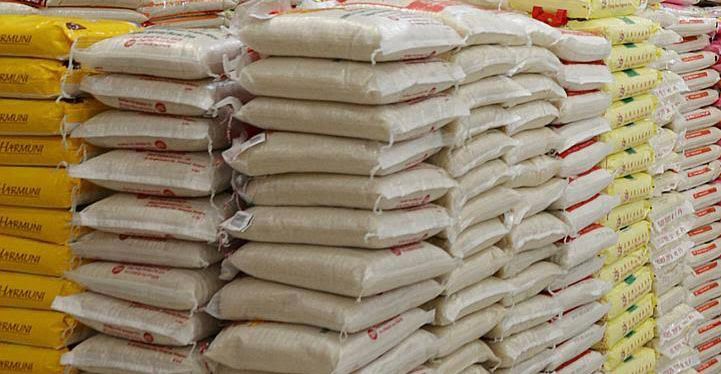Tags
Farmers decry local rice repackaging, seek intervention to boost productivity
They lamented that the development contributed to the persistent price hike and perceived unavailability of local rice in the country.

Bags of rice [Credit: Premium Times Nigeria]
The All Farmers Association (AFAN) and Rice Farmers Association of Nigeria (RIFAN) have warned members to desist from repackaging local rice in foreign bags for enhanced profit.
They lamented that the development contributed to the persistent price hike and perceived unavailability of local rice in the country.
In separate interviews on Sunday in Lagos, the associations also called for concerted efforts to boost local production.
Repackaging of rice is a situation where rice producers ‘rebag’ home-grown rice into foreign rice bags for increased profits.
The deputy chairman, AFAN Lagos State chapter, Shakin Agbayewa, called on local rice producers to ensure honesty in their dealings.
“We have a major problem in locally grown rice; we call it ‘internal smuggling’. A situation where local rice cultivators ‘rebag’ home-grown rice in foreign bags, to sell at a higher price,” said Mr Agbayewa.
According to him, Nigerians consume about 6.5 to seven million metric tonnes of rice yearly, with local production of 57 per cent.
“Unfortunately, our local production is about 57 per cent, thanks to the closure of the border by the past administration. We still have a shortfall of about 43 per cent.
“If we are honest, we can adequately meet the demands for local rice in the country.
“If all parameters are equal, local rice farmers will be able to meet the local demands for home-grown rice,” Mr Agbayewa said.
On his part, the Lagos State RIFAN chairman, Raphael Hunsa, called for concerted efforts to boost local rice production.
“We need more people involved in rice cultivation; it is not a one-man business. We need to encourage more people, especially youths, to be engaged in rice cultivation.
“Presently, local rice is not available to meet the growing demands. The Lagos State rice mill at Imota, which can produce 33,000 metric tonnes of rice per hour, is set up for the benefit of Lagos residents.
“However, as we speak, the mill does not have enough rice paddy to kick off operations,” Mr Hunsa said.
He also noted that the Lagos State government sought paddy for rice mills in Kebbi, Kaduna and other northern states.
“Whereas the rice farmers in Lagos State need support to cultivate rice without dependence on outside state sources, we need increased support to also attract more rice farmers into the sector and to encourage existing farmers,” Mr Hunsa said.
Also speaking, Percy Ibrahim, a rice farmer in Plateau State, urged the government to support more rice farmers to boost local production.
“Also, more young rice farmers should be encouraged to come into the system. They must be adequately trained to get the desired results from cultivation,” Mr Ibrahim said.
Presently, 50kg of foreign rice, long grains, sells at N76,000 per bag, while short grain, depending on the quality, is sold between N75,000 and N80,000.
A bag of 50kg foreign rice was sold for between N45,000 and N60,000 as of November and December 2023.
On the other hand, locally grown rice sells for N76,000 per 50kg bag, depending on the quality, against N50,000 last December.
https://gazettengr.com/farmers-decry-local-rice-repackaging-seek-intervention-to-boost-productivity/Published Date: July 7, 2024






